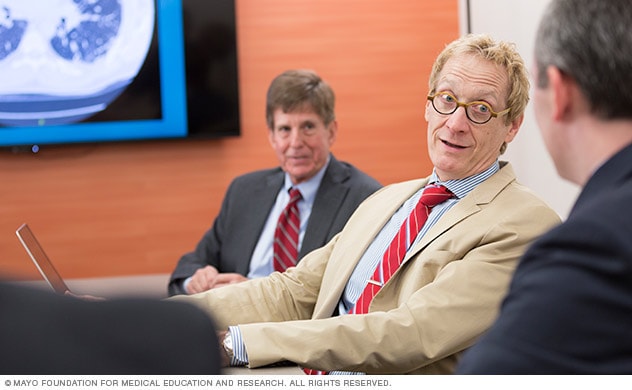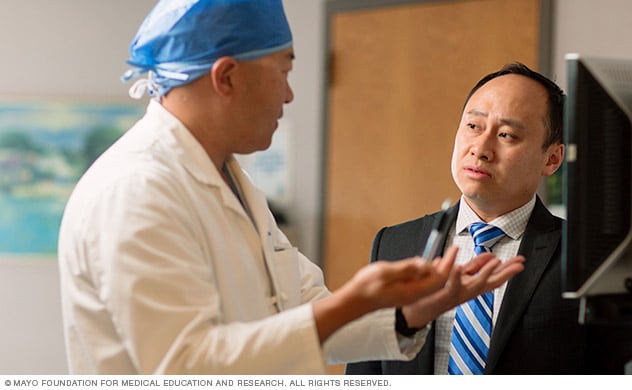Pulmonary fibrosis care at Mayo Clinic
Your Mayo Clinic care team
 Teamwork
Teamwork
Mayo Clinic doctors work together and use a team approach to care for people with pulmonary fibrosis.
Mayo Clinic experts in many specialties work together as a multispecialty team to provide coordinated, comprehensive care. Specialists trained in lung conditions (pulmonary medicine), digestive conditions (gastroenterology), diseases affecting joints and connective tissue (rheumatology), lung transplant, chest surgery (thoracic surgery), laboratory medicine and pathology, and chest imaging (thoracic radiology) may be involved in your care.
This team approach allows different experts to evaluate your condition and develop a treatment plan in a timely manner.
Advanced diagnosis and treatment
Mayo Clinic experts use the latest tests to diagnose pulmonary fibrosis. This includes imaging tests, lung function tests and lung biopsies. Mayo doctors trained in many areas work together to assess your condition and decide the right treatment.
Doctors at Mayo Clinic do research and use novel therapies to treat pulmonary fibrosis and related conditions. Mayo Clinic offers the latest medicines to treat idiopathic pulmonary fibrosis, which may help slow the condition over time.
Although pulmonary fibrosis is not common in babies and children, Mayo Clinic pediatric specialists have training and expertise in the care of children with this condition.
Mayo Clinic in Arizona, Florida and Minnesota also use novel therapies to treat joint and connective tissue conditions, such as rheumatoid arthritis. These conditions can affect the lungs and lead to pulmonary fibrosis or other lung diseases.
Mayo Clinic experts may recommend a lung transplant for some people with pulmonary fibrosis, depending on their condition. Lung transplant is available at Mayo Clinic in Arizona, Florida and Minnesota. Experts in the Transplant Center have extensive experience in evaluating and treating people who need lung transplants. Highly skilled, experienced surgeons perform lung transplant surgery.
Mayo Clinic also offers Pulmonary Rehabilitation Program for people with pulmonary fibrosis. Pulmonary rehabilitation can help you manage your symptoms and improve your functioning in daily life.
Personal approach
Mayo Clinic provides care for you as a whole person. The healthcare team takes the time to get to know you and work with you to give exactly the care you need. The team talks with you about your condition and develops the right treatment plan for you.
Expertise and rankings
Mayo Clinic in Rochester, Minnesota, Mayo Clinic in Phoenix/Scottsdale, Arizona, and Mayo Clinic in Jacksonville, Florida, are ranked among the Best Hospitals for pulmonology by U.S. News and World Report.
Experienced specialists
Mayo Clinic doctors have experience and expertise evaluating and treating people with pulmonary fibrosis and many other lung diseases. Doctors at Mayo Clinic evaluate and treat more than 12,000 people each year with all forms of pulmonary fibrosis.
 Working together to provide care
Working together to provide care
Each year, Mayo Clinic experts work together to give care to thousands of people who have pulmonary fibrosis.
Latest technology
Mayo experts study and use the latest technology available for people with pulmonary fibrosis.
Locations, travel and lodging
Mayo Clinic has major campuses in Phoenix and Scottsdale, Arizona; Jacksonville, Florida; and Rochester, Minnesota. The Mayo Clinic Health System has dozens of locations in several states.
For more information on visiting Mayo Clinic, choose your location below:
Costs and insurance
Mayo Clinic works with hundreds of insurance companies and is an in-network provider for millions of people.
In most cases, Mayo Clinic doesn't require a physician referral. Some insurers require referrals or may have additional requirements for certain medical care. All appointments are prioritized on the basis of medical need.
Learn more about appointments at Mayo Clinic.
Please contact your insurance company to verify medical coverage and to obtain any needed authorization prior to your visit. Often, your insurer's customer service number is printed on the back of your insurance card.
Feb. 15, 2024